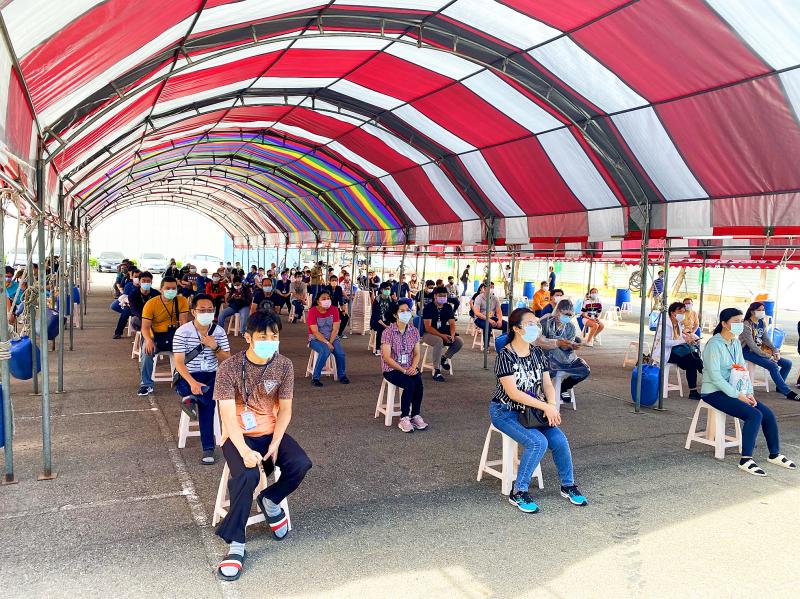King Yuan Electronics Co (京元電子) yesterday said it would shut down its factories for 48 hours to be thoroughly disinfected amid concern over COVID-19 infections linked to its manufacturing campus in Miaoli County.
As of yesterday, 67 King Yuan employees, mostly migrant workers from the Philippines, had tested positive for the disease after a large-scale rapid screening program was launched for the company’s 7,300 workers.
King Yuan, a chip testing and packaging service provider, had resisted halting production for fear of disrupting supply, kindling anger among employees and nearby residents.

Photo provided by King Yuan Electronics Co via CNA
King Yuan, headquartered in Hsinchu City, counts handset chip supplier MediaTek Inc (聯發科), display driver IC maker Novatek Microelectronics Corp (聯詠) and international corporations among its customers.
The production disruption would reduce output and revenue alike by between 4 and 6 percent this month, as its six plants in Hsinchu, and Miaoli’s Tongluo (銅鑼) and (竹南) Jhunan townships would shut down.
King Yuan posted NT$2.86 billion (US$103.17 million) in revenue last month, expanding 10.72 percent from NT$2.58 billion in May last year. That brought the company’s revenue in the first five months of this year to NT$12.17 billion, up 8.87 percent year-on-year.
The shutdown would not affect its financial performance for the full year this year, the company said.
King Yuan was the world’s No. 8 chip testing and packaging service provider last quarter, with revenue of NT$267 million, a tally market researcher TrendForce Corp (集邦科技) showed.
That gave King Yuan a market share of 3.7 percent.

RUN IT BACK: A succesful first project working with hyperscalers to design chips encouraged MediaTek to start a second project, aiming to hit stride in 2028 MediaTek Inc (聯發科), the world’s biggest smartphone chip supplier, yesterday said it is engaging a second hyperscaler to help design artificial intelligence (AI) accelerators used in data centers following a similar project expected to generate revenue streams soon. The first AI accelerator project is to bring in US$1 billion revenue next year and several billion US dollars more in 2027, MediaTek chief executive officer Rick Tsai (蔡力行) told a virtual investor conference yesterday. The second AI accelerator project is expected to contribute to revenue beginning in 2028, Tsai said. MediaTek yesterday raised its revenue forecast for the global AI accelerator used

TEMPORARY TRUCE: China has made concessions to ease rare earth trade controls, among others, while Washington holds fire on a 100% tariff on all Chinese goods China is effectively suspending implementation of additional export controls on rare earth metals and terminating investigations targeting US companies in the semiconductor supply chain, the White House announced. The White House on Saturday issued a fact sheet outlining some details of the trade pact agreed to earlier in the week by US President Donald Trump and Chinese President Xi Jinping (習近平) that aimed to ease tensions between the world’s two largest economies. Under the deal, China is to issue general licenses valid for exports of rare earths, gallium, germanium, antimony and graphite “for the benefit of US end users and their suppliers

Dutch chipmaker Nexperia BV’s China unit yesterday said that it had established sufficient inventories of finished goods and works-in-progress, and that its supply chain remained secure and stable after its parent halted wafer supplies. The Dutch company suspended supplies of wafers to its Chinese assembly plant a week ago, calling it “a direct consequence of the local management’s recent failure to comply with the agreed contractual payment terms,” Reuters reported on Friday last week. Its China unit called Nexperia’s suspension “unilateral” and “extremely irresponsible,” adding that the Dutch parent’s claim about contractual payment was “misleading and highly deceptive,” according to a statement

The Chinese government has issued guidance requiring new data center projects that have received any state funds to only use domestically made artificial intelligence (AI) chips, two sources familiar with the matter told Reuters. In recent weeks, Chinese regulatory authorities have ordered such data centers that are less than 30 percent complete to remove all installed foreign chips, or cancel plans to purchase them, while projects in a more advanced stage would be decided on a case-by-case basis, the sources said. The move could represent one of China’s most aggressive steps yet to eliminate foreign technology from its critical infrastructure amid a